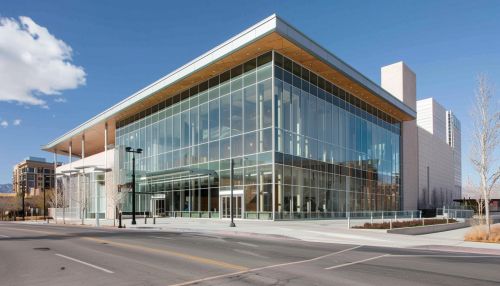Utah Symphony: Difference between revisions
(Created page with "== History == The Utah Symphony is a prominent American symphony orchestra based in Salt Lake City, Utah. Established in 1940, the orchestra has grown to become one of the major symphony orchestras in the United States. The Utah Symphony performs a diverse repertoire, including classical, contemporary, and popular music, and is known for its commitment to education and community outreach. The orchestra's founding conductor was Hans Henriot, who led the ensemble...") |
No edit summary |
||
| Line 7: | Line 7: | ||
In 1947, Maurice Abravanel was appointed as the music director, a position he held for over three decades until 1979. Abravanel's leadership was transformative for the Utah Symphony, as he expanded the orchestra's repertoire, increased its national and international profile, and established a strong recording presence. Under his direction, the orchestra made numerous recordings for the Vanguard label, many of which received critical acclaim. | In 1947, Maurice Abravanel was appointed as the music director, a position he held for over three decades until 1979. Abravanel's leadership was transformative for the Utah Symphony, as he expanded the orchestra's repertoire, increased its national and international profile, and established a strong recording presence. Under his direction, the orchestra made numerous recordings for the Vanguard label, many of which received critical acclaim. | ||
[[Image:Detail-93385.jpg|thumb|center|Exterior view of Abravanel Hall, home of the Utah Symphony. The building is modern with large glass windows and a prominent entrance.|class=only_on_mobile]] | |||
[[Image:Detail-93386.jpg|thumb|center|Exterior view of Abravanel Hall, home of the Utah Symphony. The building is modern with large glass windows and a prominent entrance.|class=only_on_desktop]] | |||
== Repertoire and Performances == | == Repertoire and Performances == | ||
Latest revision as of 10:38, 22 June 2024
History
The Utah Symphony is a prominent American symphony orchestra based in Salt Lake City, Utah. Established in 1940, the orchestra has grown to become one of the major symphony orchestras in the United States. The Utah Symphony performs a diverse repertoire, including classical, contemporary, and popular music, and is known for its commitment to education and community outreach.
The orchestra's founding conductor was Hans Henriot, who led the ensemble in its inaugural concert on May 8, 1940. Henriot's tenure was followed by that of Werner Janssen, who served as music director from 1946 to 1947. The orchestra's early years were marked by financial struggles and limited resources, but it gradually gained stability and recognition.
In 1947, Maurice Abravanel was appointed as the music director, a position he held for over three decades until 1979. Abravanel's leadership was transformative for the Utah Symphony, as he expanded the orchestra's repertoire, increased its national and international profile, and established a strong recording presence. Under his direction, the orchestra made numerous recordings for the Vanguard label, many of which received critical acclaim.


Repertoire and Performances
The Utah Symphony's repertoire spans a wide range of musical genres and styles. The orchestra performs works from the Baroque period to contemporary compositions, including symphonies, concertos, operatic works, and choral pieces. The Utah Symphony is particularly noted for its interpretations of the works of Gustav Mahler, Ludwig van Beethoven, and Igor Stravinsky.
The orchestra's performance schedule includes a regular season of concerts at Abravanel Hall, its primary performance venue. The hall, named after Maurice Abravanel, is renowned for its excellent acoustics and has been the orchestra's home since 1979. In addition to its regular season, the Utah Symphony performs at various venues throughout Utah and participates in the Deer Valley Music Festival, an annual summer event held in Park City, Utah.
Music Directors and Principal Conductors
The Utah Symphony has been led by several distinguished music directors and principal conductors throughout its history. Maurice Abravanel's tenure was followed by that of Varujan Kojian (1979-1983), Joseph Silverstein (1983-1998), and Keith Lockhart (1998-2009). Each of these conductors brought their unique vision and expertise to the orchestra, contributing to its artistic growth and development.
In 2009, Thierry Fischer was appointed as the music director, a position he held until 2022. Fischer's tenure was marked by a focus on contemporary music and the commissioning of new works. Under his leadership, the orchestra continued to expand its repertoire and engage with the community through innovative programming and educational initiatives.
Recordings and Media
The Utah Symphony has a rich discography, with numerous recordings that have received critical acclaim. The orchestra's recordings under Maurice Abravanel for the Vanguard label are particularly notable, including complete cycles of the symphonies of Gustav Mahler and Felix Mendelssohn. These recordings helped to establish the Utah Symphony's reputation on the national and international stage.
In addition to its audio recordings, the Utah Symphony has been featured in various media, including radio and television broadcasts. The orchestra's performances have been broadcast on National Public Radio (NPR) and Public Broadcasting Service (PBS), reaching a wide audience and further enhancing its profile.
Educational and Community Outreach
The Utah Symphony is deeply committed to education and community outreach. The orchestra offers a variety of educational programs designed to engage and inspire young musicians and audiences. These programs include the Youth Guild, which provides opportunities for young people to attend concerts and participate in educational activities, and the All-Star Evening, an annual event that showcases the talents of young musicians from across Utah.
The orchestra also collaborates with local schools and community organizations to provide music education and outreach programs. These initiatives aim to make classical music accessible to a broader audience and to foster a lifelong appreciation for the arts.
